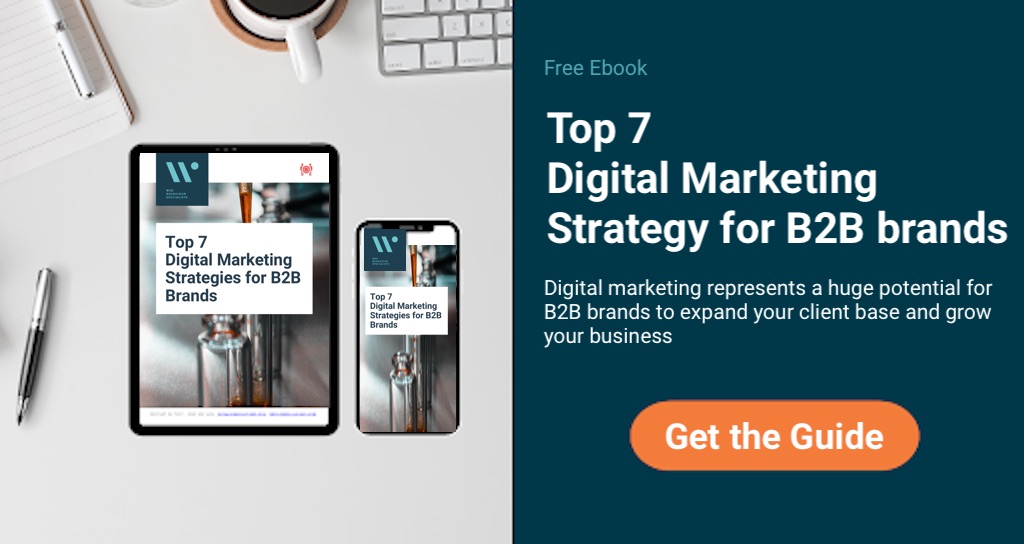Many B2B digital marketing trends are doing well already…but they are ever evolving.
Overall, we are seeing a shift where B2B buyers are behaving a lot more like B2C customers, causing a large shift in B2B sales and marketing. This isn’t surprising. After all, B2B buyers are people at the end of the day and as they become more comfortable with certain online B2C purchasing processes, this transfers to the B2B experience.
Let’s take a look at the top 5 B2B digital marketing trends.
Technology
Technology continues to transform the marketing world. Machine learning, augmented reality and artificial intelligence are there to transform every sector that relies on technology in one way or another, and it affects B2B industries as well.
Some technologies are already well developed and commonly in use for B2B brands. Powered by artificial intelligence, chatbots automate basic customer service requests, meaning customers can solve simple queries without having to speak to the business themselves. And 70% of users prefer to interact with chatbots when they need answers to simple questions. So far, in B2B areas, it’s been used as a tool to aid user experience and optimise customer service. In future, there’s potential for it to develop into much more advanced technologies.
Another area we can’t forget about here is marketing automation. Actual marketing automation systems are used by 54 percent of B2B brands. Content marketing is suitable for automation at nearly every stage: from keyword research and creation to distribution and measurement. Marketing automation tools have made content marketing more efficient and cost-effective than ever.
Machine learning will allow marketers to use customer data to build an ever more complete picture of the individuals they’re trying to target. It soon won’t be enough to know what a customer is looking for, or even what other solutions and services they’ve historically been interested in. Marketers are already looking at why their customers are seeking a solution and at what stage of the enquiry process they’re at. Marketers can then tailor their marketing materials more closely to this information.
Content marketing
It’s one of these trends that’s here to stay and will continue to grow. As the modern B2B buyer does their own research, mainly online, and they make 8 to 12 online searches before they even contact the brand, content marketing is crucial to being successful with our marketing efforts.
Why is content so important for B2B brands?
75% of B2B buyers say that content significantly impacts their buying decision and 62% say they can make a purchase selection based solely on digital content. Over 80% of B2B buyers view at least 5 pieces of content during the purchase process, and half of them view more than 8 pieces.
Content marketing done right should help your business build relationships, nurture leads and influence potential buyers. There are different types of content that B2B marketers can use but one of the top ones at the moment is thought leadership. Creating unique, relevant content that shows your expertise on the subject matter is a great way to make your brand stand out. Becoming a thought leader isn’t easy and requires quite a lot of time, but for many companies it’s well worth the effort as it helps position your brand’s subject matter expertise when it comes to solving business problems and challenges.
Another form of content getting more and more popular is the podcast. An average user listens to 7 podcasts every week making them the ideal format for connecting with on-the-move audiences.
To succeed with content marketing, B2B companies need to establish a healthy pipeline of high-quality content. It’s also essential to build a healthy search engine optimisation (SEO) framework and we mustn’t forget about measuring ROI.
Find out how to create an effective B2B content marketing strategy
Account-based marketing (ABM)
ABM is a strategic marketing approach that targets the best-fit accounts for sales and marketing efforts – you target high-value accounts with personalised and relevant messaging. Companies that are looking to start with ABM can begin by identifying their ideal customer profile and dream accounts. Additionally, decision-makers in target organisations are there to move the conversation forward.
ABM is becoming one of the most successful and efficient tactics for B2B brands. However, it requires a long-term strategy. The entire process is multichannel and through e.g. IP address-targeted ads, customised website experience, personalised videos, etc.
By targeting the right customers and delivering content that’s exclusively relevant to them, companies can extract a lot of waste from their marketing and merge marketing and sales efforts with much more precision.
85% of B2B marketers found that ABM outperformed other marketing investments when measuring ROI. The growing desire for personalisation from B2B buyers today continues to feed the need for vendors to adopt ABM now and in the foreseeable future.
More than 50% of all B2B social traffic comes from LinkedIn and 80% of leads are derived from LinkedIn.
As the biggest professional social network at the moment, LinkedIn offers great ways to target key decision makers within your target industries.
It’s clear that LinkedIn is the best performing social media platform for B2B brands as a distribution channel, a publishing platform and a referral network. B2B buyers, researchers and influencers leverage their LinkedIn profiles due to the highly valuable concentration of their core target audiences: other B2B buyers, researchers and influencers.
LinkedIn has been expanding their advertising offerings over the past few years. We see a big trend towards account based marketing (ABM), re-targeting, sponsored content and paid InMails. Thanks to LinkedIn, B2B marketers can effectively grow sales by targeting the right audience.
Personalisation
As technology gets smarter, so does marketing. Today, both B2B and B2C consumers increasingly expect the marketing material they consume to be personal.
It’s another one of those trends that’s been about for quite a while, but it’s evolving all the time.
72% of business buyers expect vendors to personalise their marketing efforts to their needs. 67% of B2B buyers have switched to vendors who provide a more consumer-like experience.
Personalisation means that the content of marketing material is specific to individual users, customised for their unique interests, activity and interactions with your organisation.
When we talk about personalisation, we don’t mean only email marketing but any other form of marketing, incl. social media posting or website content.
Understanding your audience, segmenting the B2B buyers and then, ultimately, offering an individualised experience to each customer becomes the top marketing strategy. And evolving technology will continue to offer constant support to B2B brands in the form of better data and better personalisation options.
When planning your marketing activities, it’s crucial to stay up to date with current trends and how they can potentially affect your organisation. By doing so you can set your brand up for a successful future in an ever-changing marketing landscape.









